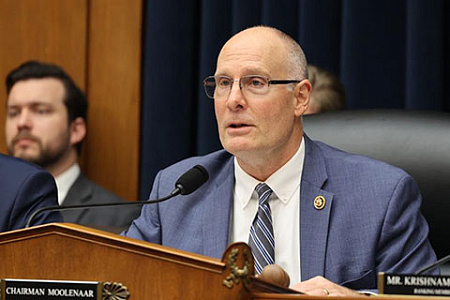
Tensions between Washington and Beijing are escalating as a senior U.S. lawmaker accuses China of engaging in coercion and intimidation, effectively holding American citizens to extract national secrets. John Moolenaar, the chairman of the House Select Committee on the Chinese Communist Party, has brought sharp focus to the plight of what media reports suggest could be over 50 U.S. nationals currently barred from leaving China, casting a significant shadow over the potential for a future summit between U.S. President Donald Trump and Chinese President Xi Jinping.
The U.S. State Department has affirmed that securing the freedom of its citizens is a paramount priority but acknowledges the complexity of these situations. Many of those under exit bans are of Chinese descent, and Beijing does not recognize dual citizenship, often leaving individuals hesitant to publicize their cases. In response to the accusations, the Chinese Embassy in Washington maintains that China welcomes American visitors—provided they adhere to local laws—and strongly denies that the detentions are politically motivated.
This diplomatic standoff is not without precedent. Critics of Washington’s stance often point to the 2018 detention of Meng Wanzhou, the CFO of Chinese tech giant Huawei, in Canada at the request of the United States. Meng was barred from leaving the country for three years in a case widely seen as leverage. More recently, in December of last year, the Biden administration conducted a direct prisoner swap with Beijing, exchanging three individuals from each side.
Highlighting the current tensions is the case of a Chinese-American citizen working in the patents division of the U.S. Department of Commerce. According to The Washington Post, this individual is under an exit ban, with his access to sensitive commercial information making him a person of high interest. Beijing’s leverage reportedly stems from an alleged discrepancy on his visa application, where he failed to disclose his employment with the U.S. government. The matter has allegedly been raised at the highest diplomatic levels.
The State Department, while declining to comment on specific cases, has publicly expressed its grave concern to Chinese authorities over the use of these arbitrary exit bans. It has warned that such actions damage the U.S.-China relationship and has called for the immediate release of all affected citizens. However, human rights advocates note that resolving these cases can take years, and the true number of affected individuals is difficult to ascertain as many fear attracting further attention from authorities.
Despite the heated rhetoric, some U.S. officials remain optimistic about high-level diplomatic engagement. Following talks with Chinese Foreign Minister Wang Yi, there is positive speculation about the prospects for a Trump-Xi summit, possibly at the upcoming APEC meeting in South Korea. This suggests that while Washington is publicly pressuring Beijing on the issue of its detained citizens, it is simultaneously pursuing a strategy aimed at stabilizing the deeply strained bilateral relationship.
